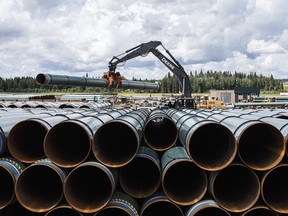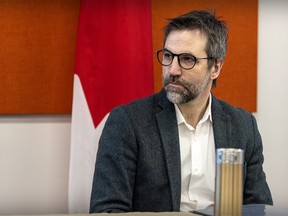‘The oil and gas industry needs investment certainty to get these projects going. The emissions cap does the opposite,’ said Kevin Krausert, CEO of Avatar Innovations
Article content
An interesting mix of CEOs, executives and business group leaders signed an open letter Wednesday to federal Environment Minister Steven Guilbeault, opposing Ottawa’s oil and gas emissions cap.
Some signatures, such as ones belonging to the new president of Canadian Natural Resources or CEO of Cenovus Energy, seem logical. Their companies are among the biggest petroleum producers in the country.
Advertisement 2
Article content
Article content
Others came from leaders at the Canadian and Calgary Chambers of Commerce — the local group penned the letter — worried about a range of issues, such as the policy’s effect on the economy and the country’s lagging productivity levels.
Kevin Krausert, CEO of Avatar Innovations, which launched a popular clean energy accelerator and training program in the city, hones in on the repercussions it will have on decarbonization spending.
“We are the only oil-producing jurisdiction in the world proposing an emissions cap, as opposed to figuring out how we drive investment into these types of projects,” Krausert said in an interview.
“The question Canada has to ask ourselves is: Do we want to win in the energy transition, or do we want to just continue along a needlessly complex and burdensome investment environment that is not competitive with the U.S., Europe or the Middle East?”
The very thing the Liberal government is striving to do — get companies to spend money to lower greenhouse gas emissions — could be put at risk by creating more investment uncertainty.
And if the federal cap moves ahead as proposed it will surely lead to a court challenge by the provinces, which have constitutional rights to make laws surrounding resource development.
Article content
Advertisement 3
Article content
“We are assuming good intentions, that they are listening to what has been presented to them,” said Calgary Chamber of Commerce CEO Deborah Yedlin.
“Is there a level of frustration that I sense? Absolutely.”
Recommended from Editorial
-

Emissions cap could hurt Trans Mountain pipeline sale price, Calgary Chamber says
-

’Not be tolerated’: Alberta files formal response to proposed oilsands emissions cap
-

Varcoe: ‘Unworkable, untenable’ — Alberta business leaders want Ottawa to scrap Canada’s oil and gas emissions cap
-

Would Alberta win a court battle over the emissions cap? What is a cap-and-trade system? Here’s what you need to know
By late afternoon, more than 35 Alberta business owners, operators, executives or groups had signed the letter, across a range of sectors, from an auto dealership group to a medical spa owner.
The oil and gas industry is the largest emitting sector in the country, accounting for 28 per cent of Canada’s greenhouse gas emissions in 2021.
As proposed, the cap would require sector emissions to fall by up to 38 per cent below 2019 levels by the end of the decade. However, flexibility measures could lower that to 20 per cent.
Advertisement 4
Article content
Many industry players have already adopted a net-zero emissions target.
Oilsands producers are collaborating to attain that goal, developing a proposed $16.5-billion carbon capture network. Last week, the Pathways Alliance group filed a regulatory application for the project’s CO2 trunk line.

However, a final investment decision is still required. Other decarbonization proposals are also being advanced.
“The oil and gas industry needs investment certainty to get these projects going. The emissions cap does the opposite,” added Krausert.
“It is the wrong focus on the wrong problem.”
The open letter to Guilbeault calls the proposed federal policy a “blunt instrument” that would have profound consequences, stranding investment and innovation.
The chamber notes Alberta already has a carbon price on heavy emitters. Canada’s national price on carbon is slated to rise to $170 per tonne by the end of the decade.
Ottawa is requiring the sector cut its methane emissions by 75 per cent by 2030. It has also introduced new clean fuel standards.
The industry and the Alberta government maintain the cap will limit oil and gas production.
Advertisement 5
Article content
The cap could even “compromise the valuation” of Ottawa’s planned sale of its Trans Mountain pipeline — if it risks steady oil production levels — and inhibit the ability of Indigenous communities to participate in and own energy developments in Canada, the letter states.

The group wants the Trudeau government to kill the cap and advance investment and promised incentives in decarbonization policies, such as the long-awaited federal investment tax credit for carbon capture projects and promised carbon contracts for difference.
Rhona DelFrari, chief sustainability officer of Cenovus Energy, said it’s important that leaders in several industries and groups are speaking out.
“A sector-specific emissions cap is unnecessary,” DelFrari said. “Adding on one more regulation, to those that are already in place, simply adds additional complexity, and it will do nothing to incent additional emissions reductions.”
A sharp response by Guilbeault to the open letter left little doubt the gap between both sides is growing.
In a statement, Guilbeault pointed out that draft rules for the policy haven’t been introduced yet, “so unless the Calgary Chamber of Commerce knows something we don’t, the conclusions they are drawing are extremely premature.”
Advertisement 6
Article content
The federal environment minister said its proposed approach “holds industry accountable” for what it’s already promised to do — cut emissions.
And he reiterated Ottawa is limiting oil and gas industry emissions, not capping production.
“The premise is quite simply false,” he stated.
“The more we incentivize oil and gas companies and executives to reinvest their windfall profits — which have ballooned to extraordinary heights over the past number of years — the more shovels-in-the-ground projects we create to cut pollution . . . We are putting people ahead of big corporate profits.”
Such rhetoric will only inflame the situation.

“I don’t think that this (open letter) is likely to persuade the federal government,” said Richard Masson, an executive fellow at the University of Calgary’s School of Public Policy.
At the legislature, Alberta Environment Minister Rebecca Schulz noted business organizations have been trying to work with the federal government, with little success.
“They’re (now) saying, ‘You know what — enough is enough, we’re going to step up and defend ourselves,” Schulz added.
“We will absolutely see (Ottawa) in court if we don’t see reasonableness in this area of policy.”
Chris Varcoe is a Calgary Herald columnist.
Article content





